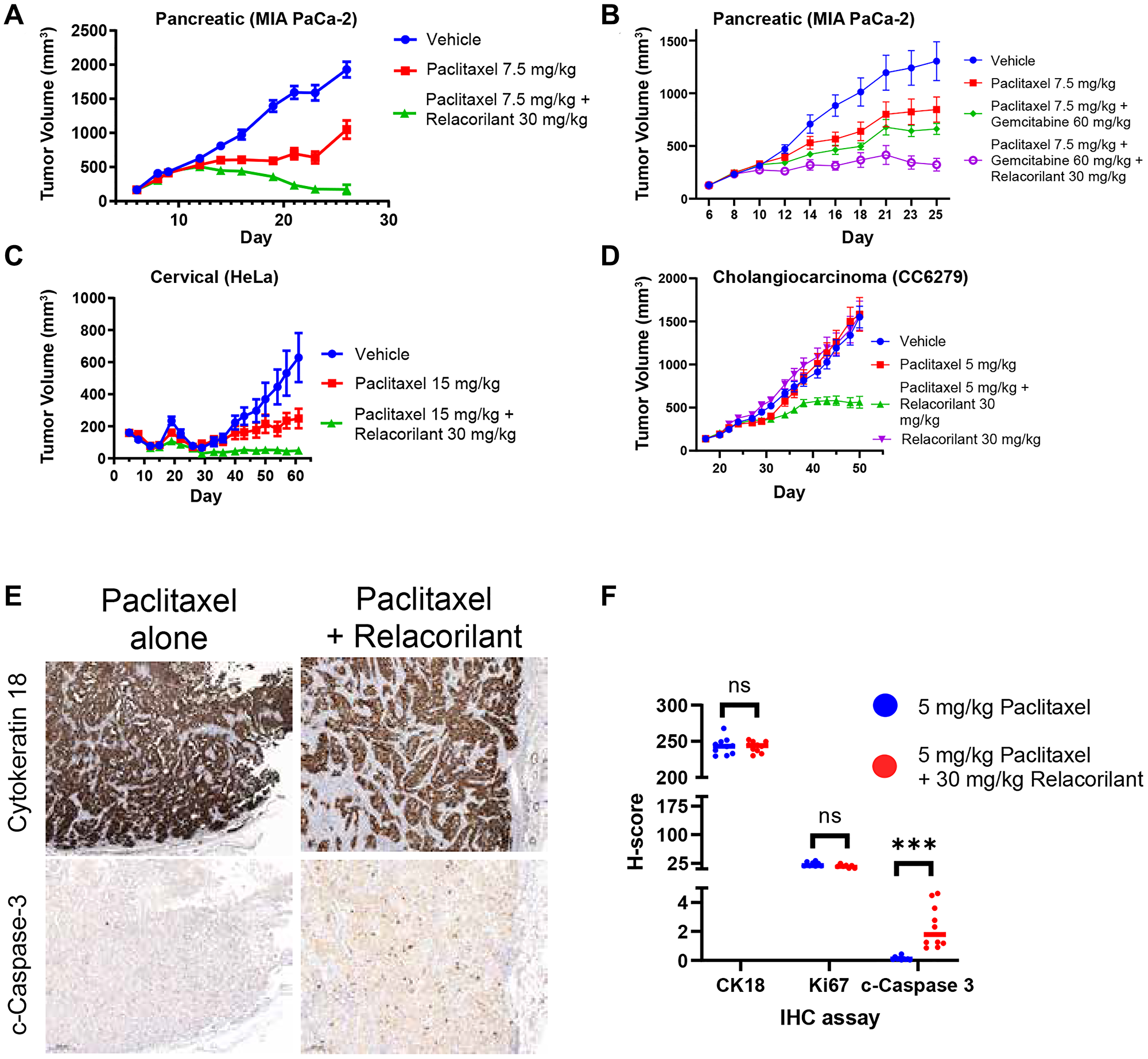Oncotarget published "Glucocorticoid receptor antagonism promotes apoptosis in solid tumor cells" which reported that to guide studies in cancer patients, relacorilant, an investigational selective GR modulator that antagonizes cortisol activity, was assessed in various tumor types, with multiple cytotoxic combination partners, and in the presence of physiological cortisol concentrations.
In the MIA PaCa-2 cell line, paclitaxel-driven apoptosis was blunted by cortisol and restored by relacorilant.
A screen to identify optimal combination partners for relacorilant showed that microtubule-targeted agents consistently benefited from combination with relacorilant.
These findings were confirmed in xenograft models, including MIA PaCa-2, HeLa, and a cholangiocarcinoma patient-derived xenograft. In vivo, tumor-cell apoptosis was increased when relacorilant was added to paclitaxel in multiple models.
These observations support recently reported findings of clinical benefit when relacorilant is added to paclitaxel-containing therapy in patients with ovarian and pancreatic cancers and provide a new rationale for combining relacorilant with additional cytotoxic agents.
Support recently reported findings of clinical benefit when relacorilant is added to paclitaxel-containing therapy in patients with ovarian and pancreatic cancers and provide a new rationale for combining relacorilant with additional cytotoxic agents.
Dr. Andrew E. Greenstein from Corcept Therapeutics said, "Drug resistance, whether primary or acquired, is a major impediment to cancer therapy."
GR agonism could contribute to tumor cell biology even in patients with normal cortisol levels.
GR agonists, including cortisol, have demonstrated pro-apoptotic effects in hematological malignancies, cytostatic effects on sarcoma-derived cell lines, and anti-apoptotic effects in carcinoma cell lines.
Unlike the non-specific steroidal GR antagonist mifepristone, relacorilant does not exhibit partial agonist activity toward human or mouse GR.
Mifepristone and relacorilant are both competitive antagonists of the GR and are best studied in the context of physiologically relevant cortisol concentrations.

Figure 4: Relacorilant improves the efficacy and promotes apoptotic activity of cytotoxic therapy in xenograft models under physiological cortisol conditions. (A) In the MIA PaCa-2 model, efficacy of the combination of paclitaxel + relacorilant was significantly better than paclitaxel alone (non-parametric T-test P < 0.0001). (B) In the MIA PaCa-2 model, efficacy of paclitaxel + gemcitabine + relacorilant was better than paclitaxel + gemcitabine alone (non-parametric T-test P = 0.0005). (C) In the HeLa model, efficacy of paclitaxel + relacorilant was significantly better than paclitaxel alone (non-parametric T-test P < 0.0001). (D) In the CC6279 model, efficacy of paclitaxel + relacorilant was significantly better than paclitaxel alone (non-parametric T-test P < 0.0001). Relacorilant alone had no significant effect on tumor growth. Error bars represent the standard error; all studies 10 animals/group. (E) Tumor cells were labeled using cytokeratin 18 immunohistochemistry (top). In serial sections, apoptotic caspase activity (cleaved caspase 3, bottom) and proliferation (Ki67, not shown) were assessed. (F) Relacorilant increased the cleaved caspase intensity and prevalence (H-score) within the tumor cells compared to paclitaxel alone. ***Mann-Whitney, P < 0.0001. Abbreviation: IHC, immunohistochemistry.
In a phase 2 study in patients with Cushing syndrome, relacorilant demonstrated the ability to reverse the effects of excess cortisol on hypertension and insulin resistance, and it is currently being studied in two phase 3 trials in patients with endogenous Cushing syndrome, GRACE and GRADIENT.
The Greenstein Research Team concluded in their Oncotarget Research Output that the initial in vitro observations suggested that an increase in apoptosis, rather than a decrease in proliferation rate, was achieved when relacorilant was added to a cytotoxic therapy.
To determine if this was recapitulated in vivo, apoptosis markers were assessed in relacorilant-treated xenografts.
The CC6279 cholangiocarcinoma model was assessed because the relacorilant effect size was greatest. Cleaved caspase 3 activity was qualitatively and quantitatively elevated in mice treated with relacorilant paclitaxel compared to paclitaxel alone, while no difference was observed for CK18 and Ki67.
Consistent with the initial in vitro observation, relacorilant promoted tumor cell apoptosis in xenograft models.
DOI - https://doi.org/10.18632/oncotarget.27989
Full text - https://www.oncotarget.com/article/27989/text/
Correspondence to - Andrew E. Greenstein - [email protected]
Keywords - glucocorticoid, tumors, apoptosis, chemotherapy, drug resistance
About Oncotarget
Oncotarget is a bi-weekly, peer-reviewed, open access biomedical journal covering research on all aspects of oncology.
To learn more about Oncotarget, please visit https://www.oncotarget.com or connect with:
SoundCloud - https://soundcloud.com/oncotarget
Facebook - https://www.facebook.com/Oncotarget/
Twitter - https://twitter.com/oncotarget
LinkedIn - https://www.linkedin.com/company/oncotarget
Pinterest - https://www.pinterest.com/oncotarget/
Reddit - https://www.reddit.com/user/Oncotarget/
Oncotarget is published by Impact Journals, LLC please visit https://www.ImpactJournals.com or connect with @ImpactJrnls
Media Contact
[email protected]
18009220957x105





